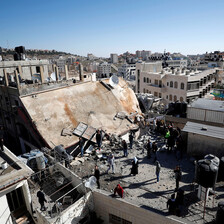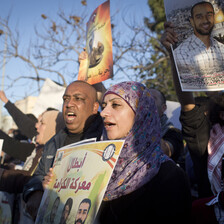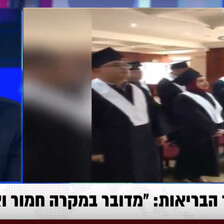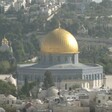The Electronic Intifada Ramallah 20 January 2016
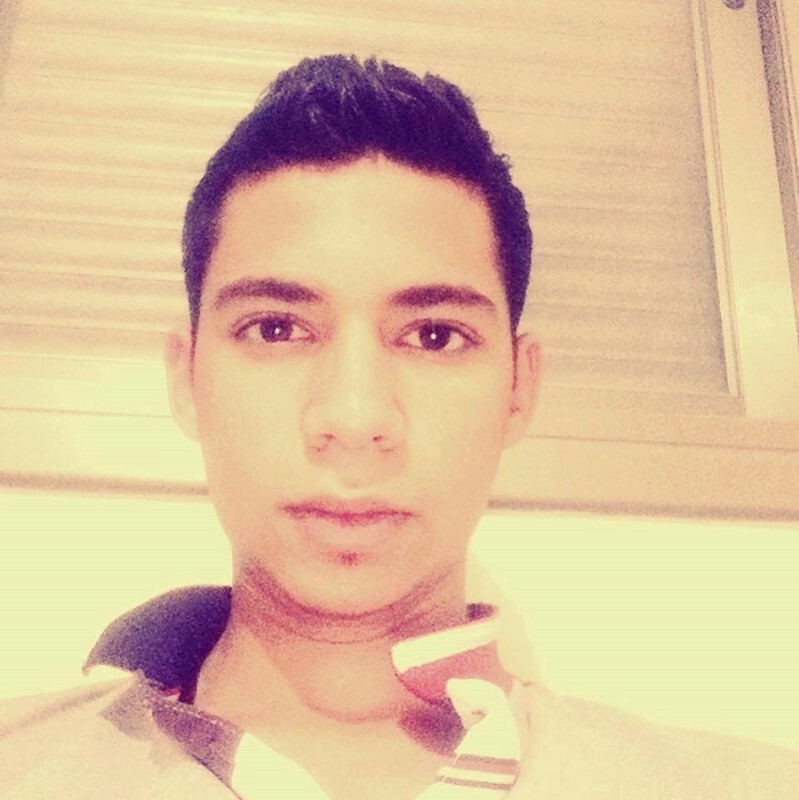
Muhannad Halabi
When Muhannad Halabi stabbed two Israeli men to death and injured a woman and a baby in Jerusalem’s Old City, he started what many Palestinians have called the “intifada of the knives.”
Halabi was shot and killed by Israeli police during the attack in early October last year and the 19-year-old law student was branded a “terrorist” by the media. His parents, however, have a sharply different view: they regard Muhannad as a hero.
“I will always be proud that my son sacrificed his life for the liberation of his homeland,” said his mother Suhair.
In his final posting on Facebook, Muhannad expressed deep anger about the incursions of Israeli settlers into the compound around al-Aqsa mosque, one of Islam’s holiest sites. He had just watched a video of a Palestinian woman being arrested by Israeli police at al-Aqsa.
Urging a “revolution,” Muhannad compared Palestine to a battered and tormented orphan who had been forsaken by fellow Arabs.
Muhannad showed his message to his parents before putting it on the Internet. “I was surprised to read it and felt that he meant every word,” said Suhair. The post was written one day before Muhannad carried out his attack.
Wake-up call
His father, Shafiq, said: “Muhannad has led the way and I feel that all those young people rising up are joining him. His attack was the wake-up call that Palestinians needed to act and break the current deadlock.”
Even Israeli military officials have acknowledged that the spate of attacks is spurred by a desire among some young Palestinians to strike at symbols of the occupation and hit back for the killings of Palestinians.
Muhannad was acutely aware of the injustices inflicted on his people.
He grew up in Surda, a village north of Ramallah in the occupied West Bank. Yet whenever Muhannad was asked where he came from, he replied that he was a native of the Ajami neighborhood in Jaffa.
His family was driven from Jaffa by Zionist forces during the Nakba, the 1948 ethnic cleansing of Palestine.

Shuhair Halabi stands on the ruins of her family’s home on 9 January, one day after it was destroyed by Israeli forces.
APA images“Muhannad always felt a sense of belonging to Jaffa without ever visiting it,” said Suhair. “He was conscious of his roots. And no power can take that consciousness away.”
One of the main targets of Muhannad’s anger was the Palestinian Authority. He felt that the PA had betrayed Palestinians by cooperating with the Israeli occupation.
The PA’s betrayal was illustrated just after Muhannad was killed. According to his father, members of the PA’s intelligence services could be seen in Surda as Israeli forces raided the village.
The PA’s agents “were not here to protect us or prevent the demolition,” said Shafiq. “They came to collect information about Muhannad and about the family.”
Similarly, the Halabis received no help from the PA when Israeli forces demolished their home earlier this month. Rather, local youths rallied to the family’s defense.
The villagers were determined to try to resist the demolition. But in the end, their rocks and burning tires proved no match to the militarized bulldozers and other weapons in Israel’s arsenal.
PA reinforces occupation
“We do not expect the PA to protect us,” said Suhair Halabi a few days before the demolition. “This authority reinforces the occupation.”
Once they learned that Muhannad had been slain, Suhair and Shafiq suspected it would only be a matter of time before their elegant two-story home in Surda would be destroyed. The Israeli government has been eager to see many revenge demolitions carried out in recent months.
The Halabis tried to prevent the demolition by going to the Israeli high court, also known as the supreme court. But all three judges handling their case ruled against them towards the end of December.
They were given 10 days to evacuate their home in Surda. Its demolition took place on 8 January.
Revenge or punitive demolitions were introduced by Britain, when it ruled Palestine under a League of Nations mandate between 1923 and 1948. Constituting collective punishment, the practice violates international law.
Yet Israel still makes use of these British regulations, with the rubber-stamp approval of its highest court. This is despite acknowledgement that these demolitions do not deter Palestinians from resisting the occupation.
“At the end of the day, the supreme court is an arm of the Israeli occupation,” said Labib Habib, a Palestinian attorney who represents the Halabis. “The legal lexicon it uses is nothing but a cloak to rationalize and legitimize the arbitrary practices of this occupation.”
Israel carries out revenge demolitions on Palestinian homes only. The relatives of Israeli Jews suspected of violent attacks on Palestinians or others need never fear being made homeless by Israel’s bulldozers.
Defiant
The Halabis struck a defiant note after the demolition. “They demolished our home but did not destroy our morale,” said Suhair. “In fact, our morale could not be higher.”
Activists in Ramallah have launched a fundraising campaign to help the Halabi family rebuild their home.
The Halabis very much appreciate such acts of solidarity. But Shafiq said that “all the money in the world” could not compensate them for the loss of Muhannad.
A similar message was conveyed to the Halabis by Muhammad Alayan, whose own son Bahaa was slain by Israel in October during an alleged stabbing attack in occupied East Jerusalem. The Alayan home has also been demolished in recent months.
“You and I will remain strong like Muhannad and Bahaa,” Muhammad Alayan stated. “Be well, for the stone [of our houses] is not more precious than their lives.”
“I put my blood and sweat into building this home,” said Shafiq, standing amid its rubble. “It is where we have lived for the last 10 years. But what stings more than the physical destruction of the home is the destruction of the memories. Every corner of this house reminded us of Muhannad.”
Surda is located in Area A of the West Bank. As part of a zoning scheme brought in by the 1993 Oslo accords, Area A is supposed to be under full control of the Palestinian Authority for both administrative and security purposes.

Palestinian youth set up barricades to try to repel invading Israeli forces in Surda on 6 October.
ActiveStillsHowever, by invoking the 1945 “emergency regulations” dating from the British Mandate era, Israel can circumvent these accords.
“When the military commander decides to implement them [the regulations], this whole distinction between Areas A, B and C is erased,” Habib added.
Muhannad Halabi knew how the Oslo agreements helped prolong the occupation.
“Just like me, he was outspoken against the Palestinian Authority and the peace process,” his father said. “We both believed that for the last 20 years, this process has only resulted in increasing colonization and home demolitions. The status quo cannot be maintained.”
Muhannad was a law student at Al-Quds University in East Jerusalem.
“He knew the ins and outs of the Oslo accords by heart,” his mother said. “He often said to me, do you want me to read to you the agreement and show you how it has stripped us of our rights and facilitated the theft of our land?”
Political family
The Halabis are a political family. Shafiq was once involved with the Democratic Front for the Liberation of Palestine but he is no longer affiliated to the group. He was imprisoned briefly during the first intifada in the 1980s.
Muhannad, meanwhile, was a member of Islamic Jihad’s student chapter and was well-known to Palestinians as an activist.
Like Shafiq, Muhannad believed that the PA’s negotiations with Israel are futile and that armed resistance is necessary. Muhannad had outlined his arguments in a letter addressed to Mahmoud Abbas, the PA’s leader, and posted on Facebook shortly before the attack.
“He was extremely passionate yet always polite in criticism, which made his critique even more trenchant,” Suhair said.
Shafiq, a plumber, had promised to help Muhannad open a joint office with his younger sister — and fellow law student — Fatimah after they graduated.
In the end, Muhannad was buried wrapped in a lawyer’s robe. The Palestinian Bar Association posthumously awarded him with an honorary permit to practice as an attorney. A placard on his grave reads: “The martyred lawyer Muhannad Halabi, igniter of the Jerusalem uprising.”
Budour Youssef Hassan is a Palestinian writer and law graduate based in occupied Jerusalem. Blog: budourhassan.wordpress.com. Twitter: @Budour48
